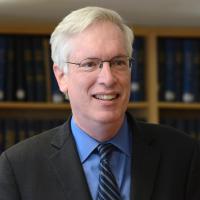
Jackson Family Establishes Endowed Chair in Health Policy and Management
At a time when public health faces unprecedented challenges, Thomas Campbell Jackson, MPH ’98, Pamela Brandt Jackson, and their family have made a bold investment in the ongoing leadership of one of the nation’s premiere health policy and management departments, creating the Thomas Campbell Jackson and Pamela Brandt Jackson Chair of Health Policy and Management (HPM). A March 26 ceremony installed longtime HPM chair Michael Sparer in the newly endowed chair.
The Jackson family’s ties to Columbia span decades and schools. After earning his MPH from HPM in 1998, Thomas Campbell Jackson took on leadership roles, including service on the School’s Board of Advisors and Alumni Board where he served as president and helped catalyze contributions supporting student scholarships. In recognition of all his leadership, including as member of the Columbia University Alumni Board, he is the recipient of the Columbia Alumni Medal for distinguished service—the University’s the highest alumni honor. The family’s multi-generational Columbia connections also include Thomas Campbell Jackson’s wife, Pamela Brandt Jackson (Barnard alumna), and their children Natalie (School of Professional Studies) and son-in-law Ben (SIPA).
Dean Linda P. Fried thanked the Jackson family for their transformative gift, calling it “a beacon of light” during challenging times for public health and higher education. It not only raised the spirits of those gathered for the celebration, she said; but “it also uplifts the future” by recognizing and supporting the vital role of leadership and scholarship in shaping a better world—one driven by innovation and bold ideas.
The event underscored the enduring relationship between the Jackson family and Columbia Mailman. Over the years, Thomas Campbell Jackson—Sparer’s former student—has provided valuable guidance on HPM's direction. Reflecting on the endowed chair, Sparer noted it makes the Jackson family “truly part of the HPM community in a special way,” adding that “their names will endure for generations to come... It’s an extraordinary recognition of our work.”
During his 15 years as HPM chair, Michael Sparer has overseen significant growth in the department’s size and stature, expanding its faculty and educational programs. Former chair Larry Brown, Sparer’s longtime collaborator, described the department as one of the best of its kind anywhere, with research that is “rigorous and relevant” and free of ideological bias. “We follow arguments where they lead,” Brown said, crediting Sparer’s collaborative leadership style.
Before joining academia, Sparer served as a lawyer and the Assistant Chief of the Affirmative Litigation Division of the New York City Law Department. Since arriving at Columbia Mailman in September 1991, he has established himself as a leading scholar in two notoriously complex fields: Medicaid policy (“the Rubik’s Cube or rocket science of health care policy,” per Brown) and U.S. health care federalism. These dual expertise areas shape his work as director of the new Center for Public Health Systems, where he connects stakeholders across the public health sector. Alongside his research and leadership, Sparer has cultivated a distinguished teaching career, earning multiple awards and inspiring generations of students.
Earlier in the day, Sparer sat down with Randy Cohen for an episode of Person, Place and Thing, discussing his father Edward Sparer’s legacy as a legal scholar and activist, his connection to Roachdale, Indiana (his wife Jo’s hometown), and his passion for basketball. The episode will air in the coming weeks.
At the conclusion of the installation ceremony, Pamela Brandt Jackson reflected on the significance of their gift in today's climate. “I had never thought that we would be in a place where giving to public health would be even more meaningful,” she said. “This gift really is from the heart.” Addressing current needs, she added, “I can't think of anything right now more important than helping public health be recognized in the United States.” Thomas Campbell Jackson echoed this sentiment while looking ahead: “We're well equipped to continue this institution's more than 100 years of advancing the public's health across the country and across the globe. We are proud to help.”

